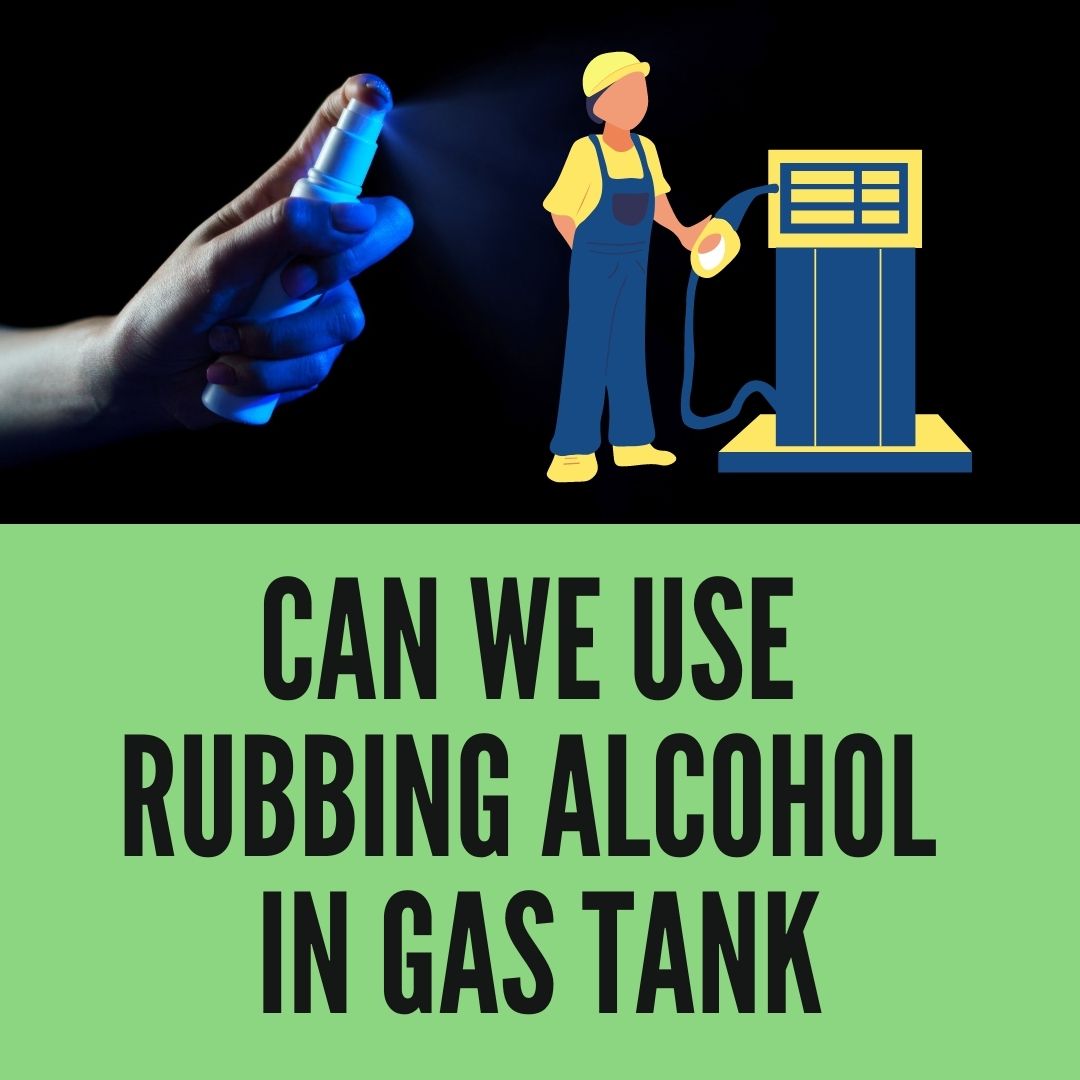
Adding Rubbing Alcohol to the vehicle’s gas tank is a common practice. Individuals around the world do so in order to eliminate water from the gas tank.
Although it may not be the best idea, it surely is a great rescue under different circumstances.
What happens if you add Alcohol to Gasoline?
Individuals who own cars with gas tanks know the struggle of driving them with water in the tank.
Water in the gas tank not only leads to danger or damaging the vehicle but can also cause severe accidents.
That is why the moment you sense water in your gas tank; you should do something to overcome it.
Wondering how? Simply pour some pure Rubbing Alcohol into your Gas Tank.
Adding Rubbing Alcohol to Gasoline or Gas tank eliminates the presence of water from the same. The principle behind it is:
When you add Rubbing Alcohol to Gasoline (combination of Gas and water), Alcohol sits at the bottom and absorbs all the water.
It further forms a combination that eliminates from the tank as and when it burns up (during driving). This combination isn’t harmful to the car but definitely helps in fighting water mixed in Gas.
Is it safe to put Rubbing Alcohol in a gas tank?
Putting Rubbing Alcohol in a gas tank is safe to the condition when you are using a pure concentration.
That means putting 99% or 91% Isopropyl in a gas tank will keep all the possibilities safe. However, adding 70%, Isopropyl isn’t recommended.
It is because Rubbing Alcohol in a gas tank works as a water absorber. And as 70% Isopropyl already contains a good amount of water, it inside gas tanks behaves like a poor absorber.
It isn’t totally unsafe, but it might prove harmful for the vehicle under a few circumstances.
Can Rubbing Alcohol be used as fuel? Can a car run on Rubbing Alcohol?
Alcohols for ages are used as fuel. For example, the Aliphatic compounds methanol, Ethanol, propanol, and butanol are common chemical and biological fuels.
Ethanol (Rubbing) Alcohol even today comes as a handy fuel for cars, but there are several reasons why individuals should not use it.
Ethanol (Rubbing) Alcohol, though it can make the car run/ operate, it is bad for Cold starting. It happens because it has 30% less energy than Gasoline; thus, Ethanol takes time for burning.
Especially if you are using Ethanol Alcohol in your cars during winters, it will behave completely useless.
Further, there are rarely any passenger cars in the world whose Engine can take E100, i.e., 100% Ethanol. A few flexible vehicles might take E85 (85% Ethanol), but it can still damage the car’s engine.
Lastly, Since Alcohol can absorb water, using it regularly can lead to rust problems in the fuel tank and line.
Can you run an engine on Isopropyl Alcohol?
No, Isopropyl Alcohol does not have the energy of Running an Engine. Even when you add Isopropyl into the Engine, it will somewhat take a low start but will eventually shut down.
This is because if the air-fuel ratio for Gas is 20:1, it requires a 10:1 air-fuel ratio for Isopropyl Alcohol.
However, when you mix Isopropyl with Gasoline or Petrol, the Engine will surely start. Still, we condemn such acts without detailed knowledge about the disadvantages and dangers.
What happens if I put Denatured Alcohol in my gas tank?
Upon adding Denatured Alcohol in the gas tank, it can attack the rubber components of the entire fuel line.
Only a small amount (half a pint to 1 pint) of Denatured Alcohol once in a while is safe for the gas tank.
Though if you increase the quantity and frequency, the gas tank may experience several damages.
Can you use Rubbing Alcohol to clean a carburetor?
Yes, Rubbing (Isopropyl) Alcohol is great for cleaning Carburetor.
This solvent comprises propane and water, which evaporates fast, leaving zero residues behind.
Here’s the step-by-step demonstration for using Rubbing Alcohol to clean a carburetor:
- Firstly, gather a bottle of Isopropyl Alcohol solution, a lint-free (microfibre) cloth, and a spray bottle.
- Now from the Carburettor, remove all the plastic and rubber parts you aim to clean.
- Further, fill Isopropyl in a spray bottle and, with its help, spray all the parts nicely with Alcohol. Make sure the Alcohol solution covers all the areas.
- Leave the treated parts for at least 15 to 30 minutes.
- Now take the lint-free cloth and wipe all the rubber and plastic parts. The grease and grime over them will now easily come off.
Can you put Rubbing Alcohol in diesel fuel?
Mixing Rubbing Alcohol into Diesel in any form or environment always shows counterproductive effects.
It happens because Diesel as a fuel has a very low octane number and a high cetane number.
In contrast Rubbing Alcohol has low cetane numbers and a very high-octane number.
Can you put Vodka in the gas tank?
It is true that vehicles can rely upon Alcohol (Ethanol) for their operations, but that doesn’t mean you can try any other Alcohol for experimenting.
When you add Vodka into your gas tank, it will flood up through your filter, resulting in power loss.
Your Engine, though, will start, but you might notice some glitches in its performance. This happens because Vodka is not Alcoholic enough.
And if the quantity of Vodka is high, it will simply stop the Engine from operating at all.
What is the best fuel treatment for water in Gas?
Water in gas tanks is one of those problems that require immediate attention. On highways, when you are troubled with high-speed despite having a perfect vehicle, chances are your gas tank has to water.
Upon driving further, you may notice sudden changes in speed without you manually operating the same.
However, to overcome the situation, you can use Fuel Stabilizers. There are a lot of options available in the market, and we have found some best amongst them:
- ISO-HEET Water Remover And Premium Fuel Line Antifreeze + Injector Cleaner
It helps in improving the Engine’s performance and Increase Gas Mileage.
- Selling brand of premium gas-line antifreeze
- Absorbs 5 times more water than regular gas dryers
- Removes water from fuel system
- Prevents rust and corrosion
- This item is not for sale in Catalina Island
- STA-BIL Storage Fuel Stabilizer
Also, keeps fuel fresh for up to 2 years and is effective for all Gasolines.
- Keeps fuel fresh for up to 24 months during storage
- Eliminates need to drain fuel prior to storage
- Ensures quick, easy starts after storage
- Effective in all gasoline, including ethanol blends
- For all gasoline engines, including 2-cycle
- Star Tron Enzyme Fuel Treatment Concentrate
It improves MPG, increases Horse Power, Rejuvenates & Stabilize Old Gasoline and reduce Emission.
- ALL-ROUND ENGINE SOLUTION - Works in all engines and all fuels, making it the ideal fuel treatment and stabilizer for any vehicle or gas powered tool
- ETHANOL PROBLEM SOLVER - Prevents and cures most ethanol-related issues, including poor performance and decreased fuel economy
- OLD FUEL REVITALIZER - Stabilizes fuel up to 2 years and can help rejuvenate old, sub-spec fuel, even after months of inactivity
- FUEL ECONOMY MAXIMIZER - Removes and prevents gum, carbon deposits, and varnish build-up, resulting in improved fuel economy
- WATER BUILD-UP PREVENTION - Disperses water throughout fuel as submicron-sized droplets that are safely eliminated while the engine operates
Wrapping up…
Rubbing Alcohol works wonderfully for removing water from Gasoline.
However, it isn’t a professional solution, and better alternatives are already available in the market.
However, if you still want to go with Alcohol, choose Isopropyl and only use it in small quantities.
We hope that all this information above will help you overcome that water problem in gas tanks and Gasoline.

My name is Logan, and I’m a 36-year-old dad who owns a small pressure-washing company in the suburbs of Atlanta, Georgia. My main goal with rubbing-alcohol.com is to show you how versatile isopropyl rubbing alcohol can be! I hope. You find it useful.



